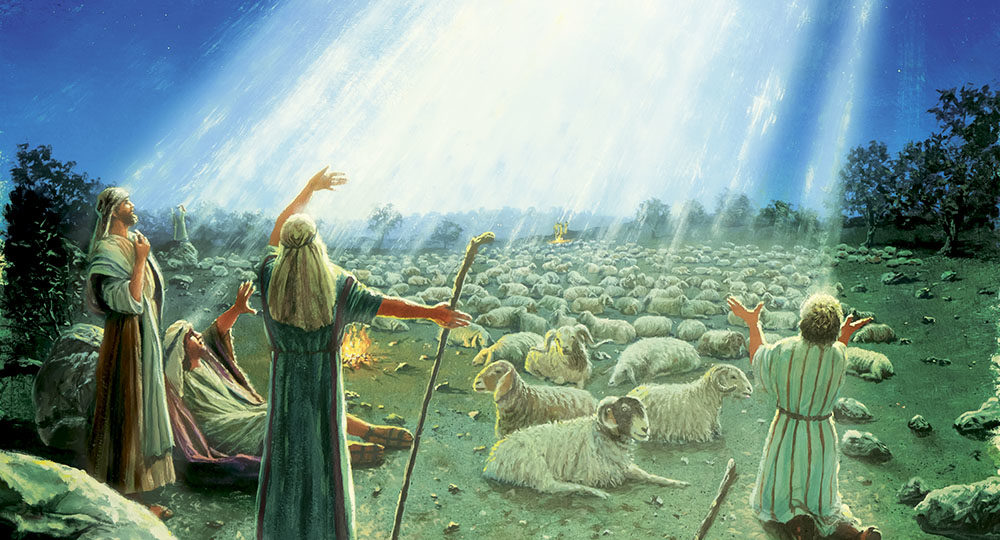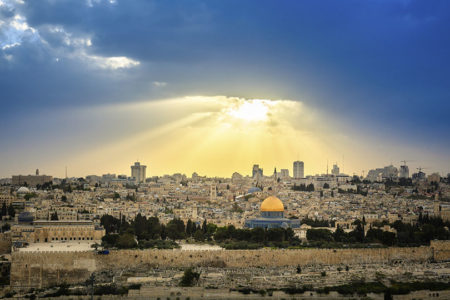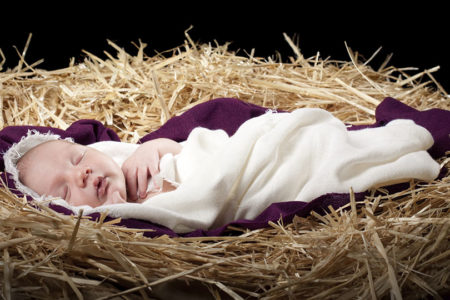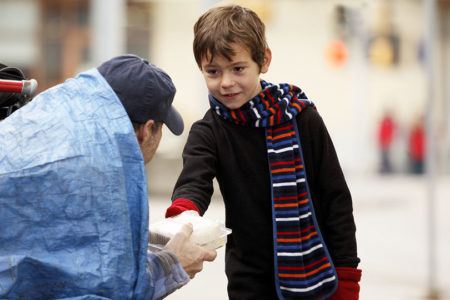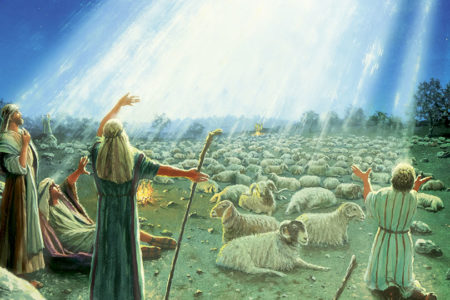The Greatest Gift of All
I still can’t believe I overslept on Christmas morning. I can’t believe any 8-year-old would oversleep on Christmas morning. I saw my father sitting near the Christmas tree, beaming with anticipation. As I sped down the steps, my eyes fell on it for the first time. It was the best gift ever—a fire truck with a three-foot-long ladder that went up and down. To this day, I don’t think any child got more pleasure from a present than I got from that fire truck.
The story of Christmas is all about a gift, but one far more important and enduring than anything found under a Christmas tree. It’s the story of the greatest gift humanity has been given. Out of His great love, God gave the world a Savior more than 2,000 years ago. Christmas is the celebration of Jesus the Messiah coming to Earth. He came to a dark and sinful world as “the light [that] shines in the darkness” (Jn. 1:5).
His birth in Bethlehem was foretold by the Jewish prophet Micah 700 years earlier (Mic. 5:2). Bethlehem, in fact, dates far back in Jewish history. It is where the patriarch Jacob buried his wife Rachel (Gen. 35:19). It was the hometown of Naomi, spoken of in the book of Ruth (1:19), and it was where David was anointed king over all of Israel (1 Sam. 16:4–13).
In Jesus’ day, Bethlehem was a small village located about five miles south of Jerusalem. The Hebrew word Bethlehem means “house of bread.” The world received its greatest gift when Jesus, the “bread of life” (Jn. 6:35), was born in “the house of bread.”
The account of Jesus’ birth is found in the Gospel of Luke:
And it came to pass in those days that a decree went out from Caesar Augustus that all the world should be registered. This census first took place while Quirinius was governing Syria. So all went to be registered, everyone to his own city. Joseph also went up from Galilee, out of the city of Nazareth, into Judea, to the city of David, which is called Bethlehem, because he was of the house and lineage of David, to be registered with Mary, his betrothed wife, who was with child. So it was, that while they were there, the days were completed for her to be delivered (2:1–6).
These were dark days in Israel. Under the heavy oppression of Roman rule, Jewish citizens were paying ever-increasing taxes to support the armies, roads, and building projects of the Roman Empire. Surely, as Joseph and Mary made the arduous, 90-mile-long journey, they saw squads of Roman soldiers along the way that reminded them of their country’s occupation.
Unable to obtain lodging in the little town crowded with visitors due to the census, they found refuge in a humble stable where Mary gave birth to the heir to the Davidic throne. They named Him Jesus, as they had been told to do by an angel while still in Nazareth: “You shall call His name JESUS [Hebrew, Yeshua], for He will save [Hebrew, yoshea] His people from their sins” (Mt. 1:21).
Mary laid her newborn in a manger (Lk. 2:7), which was probably a feeding trough. He who would feed the masses was placed in a receptacle used to feed animals.
In the vast darkness of the hillsides surrounding Bethlehem, shepherds in a nearby field were guarding their sheep. Suddenly, the sky was ablaze with light. After 400 years of silence, God spoke to His people that night using an angel to proclaim the Savior’s birth: “For there is born to you this day in the city of David a Savior, who is Christ the Lord” (v. 11).
The light increased as the angel was joined by a multitude of angels praising God. The shepherds hurried into Bethlehem, where they found the Child and His parents, just as they had been told. They left heralding the good news that the Messiah had been born.
God was also at work outside the land of Israel. He placed a special star in the sky that led others to His Son:
Now after Jesus was born in Bethlehem of Judea in the days of Herod the king, behold, wise men from the East came to Jerusalem, saying, “Where is He who has been born King of the Jews? For we have seen His star in the East and have come to worship Him” (Mt. 2:1–2).
Herod was not “born” king. He had been appointed king of Judea by Rome and ruled over the Jewish people. The wise men’s revelation threatened him. Known for being a subtle and talented diplomat as well as being utterly deranged, Herod asked scholars of the Hebrew Scriptures where the Messiah was to be born. When he learned it was Bethlehem, he slyly told the wise men to find the Child and “bring back word to me, that I may come and worship Him also” (v. 8).
The star led them to the Child. But in obedience to a revelation from God through a dream, the wise men took a different route home, avoiding Herod. In a rage, Herod ordered all males in Bethlehem aged two and under killed. Unbeknown to him, God had warned Joseph to flee to Egypt, where Jesus was safe from Herod. After Herod died, Joseph, Mary, and Jesus returned to Israel. God had protected His Son, through whom He planned to bless the world.
The Christmas story is an account of God’s remarkable love for humanity. In love, He brought Joseph and Mary to exactly the right place at exactly the right time. In love, He provided exactly the right place for Jesus to be born; and in love, He preserved Jesus’ life.
In love, He also revealed the birth to shepherds and wise men and proclaimed His love through angels. In His love for humanity, God has preserved the story of the Messiah’s birth for more than 2,000 years. And in love, He gives the gift of everlasting life to anyone who repents of sin, stops trusting in good deeds, and comes to Jesus for forgiveness: “The one who comes to Me I will by no means cast out” (Jn. 6:37).
Jesus said, “Most assuredly, I say to you, he who hears My word and believes in Him who sent Me has everlasting life, and shall not come into judgment, but has passed from death into life” (5:24).
My parents gave me many gifts over the years. The fire truck is the earliest Christmas present I remember. Eventually, it lost its luster. The paint grew dull, and the ladder no longer went up and down. One day it was thrown away.
Nothing will ever diminish the glorious gift God gave mankind in Jesus Christ. One day the Babe born in the manger will return to Earth. But this time He will be the King of kings and Lord of lords—the Messiah of Israel who reigns and rules. And every knee will bow and every tongue confess “that Jesus Christ is Lord, to the glory of God the Father” (Phil. 2:11).
